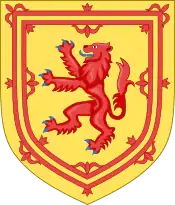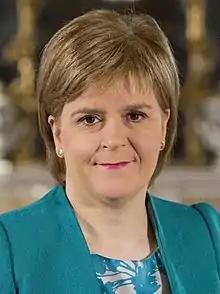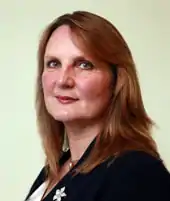List of political parties in Scotland
| This article is part of a series on the |
| Politics of Scotland |
|---|
 |
|
|
This article lists political parties in Scotland.
Overview
The Scottish National Party (SNP) is the main political party in Scotland which supports at times Scotland becoming an independent nation or further devolution. They are overall centre-left, and sometimes considered big-tent, advocating social democracy, nuclear disarmament and closer ties to the European Union. They were founded in 1934 and formed a permanent grouping in House of Commons in 1967. Their best election result in the 20th century was at the general election of October 1974 in which they won 11 of Scotland's 72 Westminster seats as well as around 30% of the popular vote, however they lost all but two of these seats in 1979. Support for the party was bolstered under the leadership of Alex Salmond, who in 2011 led the SNP to their best electoral performance to date, in which they became the first party in the devolved Scottish Parliament to win a majority of seats. They form the Scottish government, and are now led by Scotland's First Minister, Nicola Sturgeon. They have 61 Members of the Scottish Parliament (MSPs) and 47 Members of the Parliament of the United Kingdom (MPs).
The Scottish Conservative Party is the Scottish wing of the UK-wide Conservative Party. It was founded in 1965 out of the merger of the Scottish Unionist Party, which had been a dominant political force in Scotland for much of the early 20th century, winning the majority of votes and seats in the 1955 general election. However the party went into decline, being reduced from 21 Scottish seats in 1983, to 10 in 1987. The 1997 general election was a catastrophe for the Scottish Conservatives, who were left with no Scottish seats whatsoever. However the party won 18 seats in the Scottish Parliament in the 1999 election due to proportional representation. Since 2001 the Conservatives have held 1 Scottish seat in the UK parliament. Like the wider UK Conservative Party, the party is a centre-right party, which promotes conservatism and British unionism. They currently have 30 MSPs, led in the Scottish Parliament by Douglas Ross and 6 MPs.
The Scottish Labour Party is the Scottish wing of the Great Britain-wide Labour Party. It was the most successful party in Scottish elections from 1959 to 2007. Like the wider UK Labour Party, they are centre-left and they promote British unionism. They first overtook the Conservatives as Scotland's largest party at the 1959 general election. In 1997, the UK Labour Party under Tony Blair offered Scotland a referendum on devolution which was passed with around 74% of the electorate in favour. From 1999 to 2007, they were in power in the Scottish Parliament through a coalition with the Liberal Democrats. From 2008-2011, the party was led by Iain Gray in the Scottish Parliament, who announced his resignation after the party's defeat at the 2011 Scottish election. Johann Lamont became leader in 2011 and resigned in 2014 after an internal dispute within the party. They currently have 1 MP and 24 MSPs. As of 2019 they are led by Richard Leonard MSP.
The Scottish Liberal Democrats are the Scottish wing of the Great Britain-wide Liberal Democrats party. It is a centrist, social liberal and British unionist party. The British Liberal Democrats they are part of were formed out of the old Liberal Party and the Social Democratic Party in 1988. Their leader is Willie Rennie. Since the formation of the Conservative-Liberal Democrat coalition at Westminster, support for the Liberal Democrats has fallen sharply, and the party won five seats at the 2011 Scottish parliamentary election. They also lost their Scottish MEP at the 2014 European Elections. They also lost 10 of their 11 House of Commons seats at the 2015 general election, with Deputy Leader Alistair Carmichael the only MP managing to keep his seat. They currently have 5 MSPs and 4 MPs.
The Scottish Green Party sit between the centre-left and the left-wing. The party promotes green politics, Scottish independence, Scottish republicanism, equality and radical democracy. It retains close ties with the Green Party of England and Wales and the Green Party in Northern Ireland, having all originated in the breakup of the UK Green Party. However, all three parties are now fully independent. It won its first seat in the Scottish Parliament in 1999. They currently have 5 MSPs and no MPs.
Reform UK Scotland is the Scottish wing of the UK-wide Reform UK. It is a Euroscepticism and Popularist party. The party gained its first elected representative in January 2021, when sitting independent MSP Michelle Ballantyne joined the party and became leader of the party in Scotland. The party has no other elected members in Scotland.[1] Ballantyne had been elected as a Conservative at the 2016 election, but resigned from the party in November 2020, citing differences with the new leader Douglas Ross.[2]
Parties with elected representation
Scottish Parliament and/or House of Commons
There are six parties in Scotland that have elected representation in either the Scottish Parliament or House of Commons. All except the Scottish Greens and Reform UK have representation in both. In addition, all parties have elected representation at the local government level with the exception of Reform UK.
Local government
There are several parties in Scotland that have elected representation only at the local government level.
| Party | Founded | Ideology | Leader | Council area | Councillors | |
|---|---|---|---|---|---|---|
| Orkney Manifesto Group | 2013 | Localism, Social liberalism | Rachael King | Orkney Islands | 2 | |
| Independence for Scotland Party | 2020 | Scottish independence | Colette Walker | Argyll and Bute | 1 | |
| Rubbish Party | 2017 | Localism, Environmentalism | Sally Cogley | East Ayrshire | 1 | |
| Scotia Future | 2020 | Scottish independence | Charles Brodie | Renfrewshire | 1 | |
| Scottish Libertarian Party | 2012 | Libertarianism, Scottish independence, Cultural liberalism, Classical liberalism, Minarchism, Euroscepticism | Thomas Laird | Aberdeenshire | 1 | |
| West Dunbartonshire Community Party | 2016 | Socialism | Drew MacEoghainn | West Dunbartonshire | 1 | |
Parties with no elected representation
Notable registered parties
There are a number of notable registered parties in Scotland with no elected representation. Some operate exclusively within Scotland, while others may also be active in other parts of the United Kingdom.
Historical and deregistered parties
Notable historical parties
- Communist Party of Great Britain
- Communist Party of Scotland
- Crofters Party
- Fife Socialist League
- Fishing Party
- Highland Land League
- Independent Labour Party
- Labour Party of Scotland
- Left Alliance
- National Party of Scotland
- Publican Party
- Scottish Labour Party (1888)
- Scottish Labour Party (1976)
- Scottish Militant Labour
- Scottish Party
- Scottish Republican Socialist Party
- Scottish Voice
- Scottish Workers Republican Party
- Unionist Party
See also
| Wikimedia Commons has media related to Political parties in Scotland. |
Notes
- Political parties are under no legal obligation to publish membership statistics and there is no uniformly recognised definition of membership.
- Some candidates stand as Labour and Co-operative joint candidates due to an electoral alliance with the Co-operative Party.
- Styled by the party as co-spokespersons.
References
- "Former Tory MSP to lead Scots wing of rebranded Brexit Party". BBC News. 11 January 2021. Retrieved 11 January 2021.
- "MSP Michelle Ballantyne quits Scottish Tories". BBC News. 24 November 2020. Retrieved 11 January 2021.
- Audickas, Lukas; Dempsey, Noel; Loft, Philip (9 August 2019). "Membership of UK political parties". House of Commons Library. Retrieved 9 January 2021.
- Hutcheon, Paul (3 February 2021). "Scottish Labour 'crisis' after leaked figures show fall in membership". Daily Record. Retrieved 3 February 2021.
- "Scottish Liberal Democrats Annual Report and Financial Statements". Electoral Commission. 24 June 2019. Retrieved 9 January 2021.
- "Scottish Green party loses 30% of members since 2014 indyref". The National. 4 August 2019. Retrieved 9 January 2021.
External links
- Electoral Commission official site of the Electoral Commission


.jpg.webp)
.JPG.webp)

.png.webp)
